1. Ratification Procedure and Date
a) Which ratification procedure will apply in your country?
Referendum not legally binding followed by Parliamentary Ratification. The absolute majority of the members of Spanish Parliament is needed. The legal base is the article 93 of the 1978 Spanish Constitution.
b) The referendum
(i) Date which the referendum was held
Sunday, 20 February 2005
(ii) Who convoked it?
The President of the Government and the Council of Ministers. counting with the unanimous support of the Parliament. Legal base: Article 92 of the Spanish Constitution.
(iii) the wording of the referendum question)
“Do you approve the Treaty by which a Constitution for Europe is established?
Referendum results
| National Voter Turnout | ||
| Total Voters | 14,204,663 mill | 42.32 % |
| Abstention | 19,359,017 mill | 57,.8 % |
| Nation Wide Results | ||
| YES | 10,804,464 | 76.73 % |
| NO | 2,428,409 | 17.24 % |
| Blank Vote | 849,093 | 6.03 % |
| Autonomous Communities with the highest percentage of NO votes | ||
| YES | NO | |
| Basque Country | 62,6 | 33,6 |
| Catalonia | 64,6 | 28,0 |
| Navarra | 65,3 | 29,2 |
| Turnout in other referendums | |
| European Constitution Referendum 2005 | 42.3 % |
| NATO Referendum 1986 | 59.4 % |
| 1978 Constitutional Referendum | 67.1 % |
| Spanish turnout in European parliamentary elections | |
| 2004 | 45,1 |
| 1999 | 64,3 |
| 1994 | 59,1 |
| 1989 | 54,7 |
| 1987 | 68,5 |
b) What will the procedure look like? Are there any procedural peculiarities
(1) On 21 October 2004, the Spanish “Consejo de Estado” (similar to the French Conseil d’Etat) advised the government to consult the Constitutional Court on whether the supremacy clause of the European Constitution (Art. I-6) together with articles II-111 and II-112 on the application of EU rules, contradicted article 9 of the Spanish Constitution establishing the latter as the country’s supreme norm.
(2) Following the Council of Ministers request on 5 November 2004, on 13 December 2005 the Spanish Constitutional Court ruled that no problem of compatibility existed, in view of which no constitutional reform was required.
(3) Since the referendum was consultative, there were not any minimum turnout conditions. According to Spain’s electoral regulations, the Government may have not campaigned in favour or any option, nor invite citizens to participate; it could only inform them about the nature of the referendum, the date when it was held and the question posed. The Government’s strict neutrality was due to a recent ruling by the Central Electoral Court that argued, in line with the claims of some citizens, that in political terms it is just as legitimate to abstain as it is to turn out to vote, in view of which the Government should not take sides. No Government funds may have used in favour of the “yes”, “no” or abstention options, and there was no extra money available for political parties. Political parties had to use their own budgets to campaign.
(c) The referendum was consultative, what was the motivation for holding it?
There were two main reasons, one democratic, the other strategic. Firstly, until now Spaniards have not been able to express their support for the European Union in a referendum; curiously, neither the accession treaty, nor indeed any other subsequent EU Treaty (Maastricht, Amsterdam, Nice) were ever subject to a popular vote. Since the new text calls itself a Constitution, the government and all major political forces have agreed that the time has finally come to allow voters to express their views. Secondly, by holding the first referendum in Europe, the new Government wanted to make visible the new orientation of Spain’s European policy following the defeat of José María Aznar´s Popular Party in March 2004. Confident of a landslide victory of the “yes” option, the new Government hoped the result would have a positive impact on other countries, notably France, and also expected the outcome to strengthen its leadership in Europe at a crucial moment for Spain (bearing in mind the forthcoming negotiation of the financial perspectives for 2007-2013. The major opposition party, however, regards the Government’s determination to ensure that Spain was the first member state to hold a referendum as unnecessarily risky, and even potentially counter-productive.
2. Support for the Constitutional Treaty
a) How was the evolution of the support to the Constitutional Treaty according to the polls?
According to the Eurobarometer Special 214 on “The Future Constitutional Treaty” (January 2005), 56% of Spaniards were in favor of the Constitutional Treaty, 7% were opposed, and 37% didn’t know.
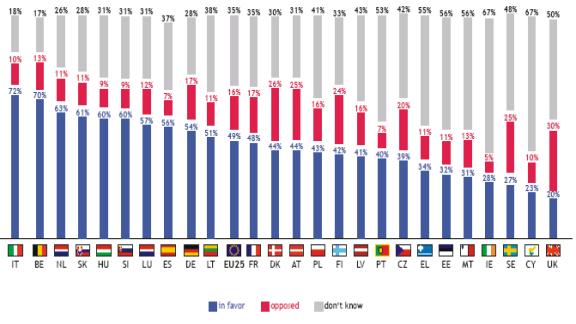
– Likely support in a Referendum (in %):
Sigma Dos for Newspaper El Mundo (http://www.elmundo.es/) published on October 12, 2004.)
· Yes: 36.5%
· No: 3.2%
· Undecided: 42.6%
· Will not go to vote: 12.4%
· Blank vote: 5.2%.
OPINA for CIS/Elcano Royal Institute (http://www.realinstitutoelcano.org/) published on December 10, 2004)
- Yes: 41.6 %
- No: 6 %
- Undecided: 35.6 %
- Will not go to vote: 9.7 %
- Blank Vote: 5.1%
OPINA for SER Radio, on January 19, 2005 (http://www.cadenaser.com/)
- Yes: 45,3 %
- No: 7,1 %
- Undecided:35,21 %
- Will not go to vote:11,3 %
- Blank Vote: 0,9 %
CIS, January 24, 2005 (http://www.cis.es/)
· Yes: 51,2%
· No: 5,7 %
· Undecided:22,1 %
· Abstention:16,4%
· Blank Vote:4,6%
OPINA for SER Radio, February 2, 2005 (http://www.cadenaser.com/)
· Yes: 40,4 %
· No: 6,5 %
· Undecided:38 %
· Abstention:10,9 %
· Blank Vote: 1,6 %
Celeste Tel for the newspaper La Razón, February 10, 2005 (http://www.larazon.es/)
· Yes: 37,1 %
· No: 3,9 %
· Abstention: 58,4 %
· Blank Vote: 0,7 %
Noxa Institute for the newspaper La Vanguardia, February 10, 2005 (http://www.larazon.es/)
· Yes: 57 %
· No: 14 %
Voting intention on the European Constitution
| February, 2004 | June, 2004 | October 2004 | November,2004 | December, 2004 | January 4 2005 | January 19, 2005 | January,24, 2005 | February 2, 2005 | |
| Elcano/BRIE | Elcano/BRIE | CIS | CIS | CIS/Elcano | Opina/SER | Opina/Ser | CIS | Opina/SER | |
| In favour | 63 | 68 | 37 | 45 | 42 | 36 | 45 | 51 | 40 |
| Against | 4 | 3 | 3 | 4 | 6 | 6 | 7 | 6 | 7 |
| Blank | 8 | 6 | 5 | 5 | 5 | 2 | 1 | 5 | 2 |
| Abstain | 13 | 8 | 12 | 14 | 10 | 14 | 11 | 16 | 11 |
| Undecided | 12 | 14 | 43 | 30 | 37 | 42 | 35 | 22 | 38 |
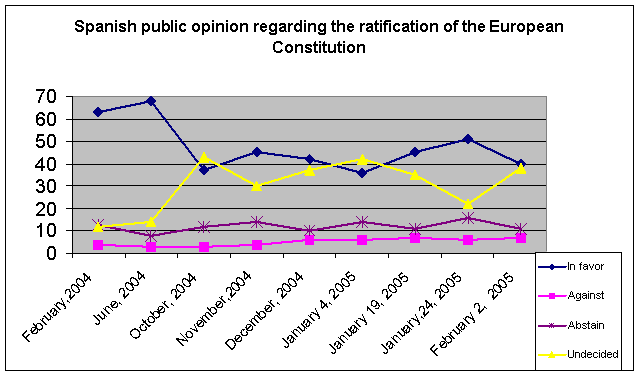
Possible participation in the nine referenda currently scheduled
(EB Barometer, January, 2005)
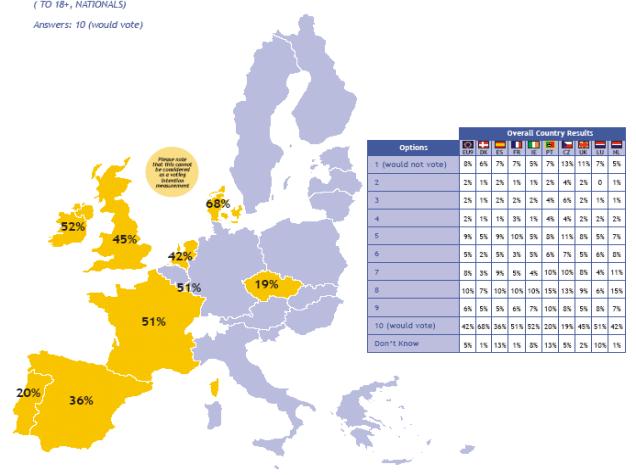
Likewise, the lack of knowledge of the Spanish public opinion regarding the European Constitution is due to highlight, according to different surveys.
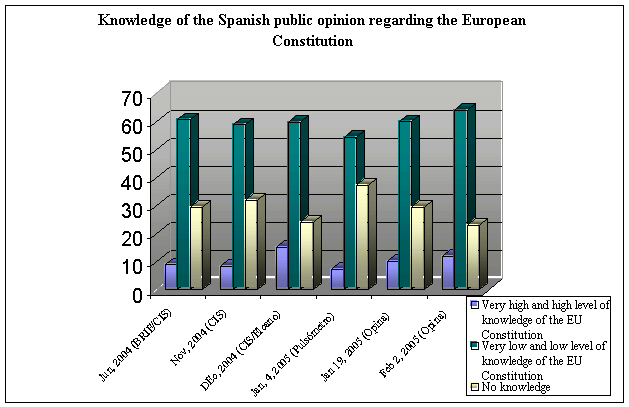
Parliamentary support for the Constitutional Treaty
Total members of the Parliament – Congreso de los Diputados -: 350 members.
· Yes: 332 (94.8%)
o Which parties?: PSOE (164), PP (148), PNV (7), CC (3), UDC (4) CDC (6)
· No: 18 (5.1%)
o Which parties? ERC (8), IU-IC (5), BNG (2), EA (1), CHA (1), Na-Bai (1)
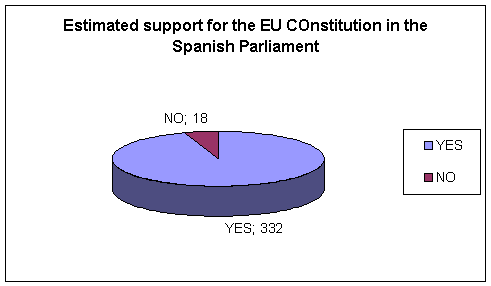
Government coalition and support for EU Constitution
| Zapatero’s Investiture | Announced vote on the European Constitution | ||||
| Yes | No | Abst | Yes | No | |
| PSOE | 164 | 164 | |||
| ERC | 8 | 8 | |||
| IU | 5 | 5 | |||
| CC | 3 | 3 | |||
| BNG | 2 | 2 | |||
| CHA | 1 | 1 | |||
| PP | 148 | 148 | |||
| CIU | 10 | 10 | |||
| EAJ-PNV | 7 | 7 | |||
| EA | 1 | 1 | |||
| Na-Bai | 1 | 1 | |||
| Total | 183 | 148 | 19 | 332 | 18 |
| Needed | 176 | 176 | 18 |
3. Key Players
Important players which had an important role in the debate about the ratification
a) Institutions
Constitutional Court……………………………. x for ….
against
The Constitutional Court ruled on 13 December 2004 that the EU Constitution is in line with the Spanish Constitution, so a reform is not needed.
Other: Council of State ( Spanish Conseil d’Etat)….x for ….
against
(Its opinion recommended the Government to consult the Constitutional Court on the issue of supremacy of EU Constitution, October 21, 2004)
b) Civil Society
X Unions……………………………………………X for….
against
X Employers Associations………………………..X for….
against
X Business…………………………………………X for….
against
Church…………………………………………….
for….
against
X Other Anti-globalization movements………….
for….X against
5. Personalities
Please identify the most notable personalities that are likely to influence the debate in your country.
| Name | Party or Affiliation | Position on the Constitutional Treaty |
| José Luis Rodríguez Zapatero | President of the Government | Strongly in favour of the European Constitution |
| José María Aznar | Former President of the Government | Very telling silence (presumably luke- warm about the Constitution; favours Nice Treaty) |
| Mariano Rajoy | Leader of the main opposition party (Popular Party) | In favour of the European Constitution |
| Felipe González | Former President of the Government | In favour of the European Constitution; but has expressed doubts about advisability of Referendum |
6. Positions of national political parties?
| Party Name | English Translation | Government Party(Yes/ No) | Share of Seats in Nat. Parl.(Approx.) | EP Party Group | Position on the Constitutional Treaty(For/ Against/ Undecided) |
| Partido Socialista Obrero Español (PSOE) | Spanish Socialist Workers’ Party | YES | 164 | PES | FOR |
| Partido Popular (PP) | Popular Party | NO | 148 | EPP-ED | FOR |
| Esquerra Republicana de Catalunya (ERC) | Republican Left of Catalonia | NO | 8 | GR/EFA | AGAINST |
| Partido Nacionalista Vasco (EAJ-PNV) | Basque Nationalist Party | NO | 7 | GR/EFA | FOR |
| Convergència Democràtica Catalunya (CDC) | Democratic Convergence of Catalonia | NO | 6 | ELDR | FOR |
| Izquierda Unida (IU) | United Left | NO | 5 | EUL | AGAINST |
| Unió Democràtica de Catalunya (UDC) | Democratic Union of Catalonia | NO | 4 | EPP-ED | FOR |
| Coalición Canaria | Canary Islands Coalition | NO | 3 | FOR | |
| Bloque Nacionalista Galego (BNG) | Nationalist Bloc of Galicia | NO | 2 | GR/EFA | AGAINST |
| Eusko Alkartasuna (EA) | Basque nationalists | NO | 1 | Non-aligned | AGAINST |
| Nafarroa Bai | Navarrese | NO | 1 | AGAINST | |
| Chunta Aragonesista | Aragonese Party | NO | 1 | GR/EFA | AGAINST |
7. Central themes and issues in ratification campaign
a) Overarching themes linked to the EU:
X EU-membership in general (e.g. national sovereignty & independence)
X in favour
against
Limits and identity of the EU (e.g. membership of Turkey)
in favour X against
X Economic benefits (access to common market)
X in favour
against
Budgetary Issues (e.g. “netpayer” debate)
in favour
against
Democracy of the EU (e.g. democratic control of the “Brussels bureaucracy”)
in favour
against
X EU’s Role in the World (e.g. “global player”, transatlantic relations)
X in favour
against
X ‘European Social Model’
X in favour
against
Future of the Stability Pact
in favour X against
b) Issues directly linked to the Constitutional Treaty:
X Voting weights in the Council:
in favour…..X against
Extension of QMV:
in favour…..
against
X Charter of Fundamental Rights: X in favour…..
against
Exit Clause:
in favour…..
against
Provisions for ‘enhanced cooperation (‘Core Europe’):
in favour…..
against
Permanent EU President:
in favour…..
against
X EU Foreign Minister: X in favour…..
against
X Common Foreign Policy (CFSP): X in favour…..
against
Common Security Policy (ESDP): X in favour…..
against
X JHA issues (Asylum Policy, Border Control, etc.): X in favour…..
against
European Public Prosecutor:
in favour…..
against
c) National issues
Lack of recognition of Catalan/Basque/Galician/ as officials languages…
in favour….X against
Lack of participation of regions in EU Policy decision making………….
in favour….X against
Lack of reference to Christianity in the EU Constitution Preamble……..
in favour….X against
8. Influences from other Member States on the domestic debate.
There was no influence in the domestic debate on the constitution by events in other Member States
Authors: José I. Torreblanca / Alicia Sorroza
Elcano Royal Institute of International Strategic Studies

